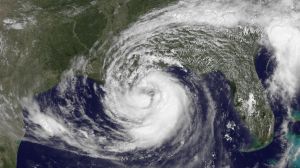
Source: Handout / Getty
Here’s what you need to know. Hurricane season starts today June 1st and typically runs from June through November.
Things you need to know to be prepared… CLICK HERE for safety tips and more…. .
• If you are directed by local authorities to do so. Be sure to follow their instructions.
• If you live in a mobile home or temporary structure – such shelters are particularly hazardous during a hurricane no matter how well fastened to the ground.
• If you live in a high-rise building – hurricane winds are stronger at higher elevations.
• If you live on the coast, on a floodplain, near a river, or on an island waterway.
• You should be able to move your valuables within 15 minutes.
Here are more tips to help you prep for the storms, from the NWS guide.
• Elevation matters: Are you in a flood or evacuation zone?
• Mobile homes: Check tie-downs and prepare to evacuate.
• Landscaping: Always trim trees, shrubbery and dead limbs, especially close to your home.
• Roofing: Inspect it for loose tiles, etc., and clear loose or clogged gutters and drainspouts.
• Doors: Reinforce garage doors and tracks or replace with a hurricane-tested door; and reinforce double-entry doors with heavy-duty foot and head bolts. Use security dead bolts with a minimum 1-inch bolt length.
• Windows: If possible, install hurricane shutters. Alternatively, use five-eighths inch (or greater) grade exterior plywood secured by 2 1/2 inch screws and/or special clips.
• Renters need to prepare, too: Review your renter’s and flood insurance; prepare to relocate to a lower floor
• For pets: Update their vaccinations and have proof; have a current photo; have properly sized pet carriers; pack enough food and water for the duration of the evacuation; and be sure to have proper ID collars. Read more.
The NWS also recommends preparing emergency evacuation kits for functional and medical needs clients, those clients who either require support to maintain their independence or support of trained medical professionals.
• Contact information, including doctor’s contact
• Special equipment, if needed; and a list with style and serial numbers of included medical devices















